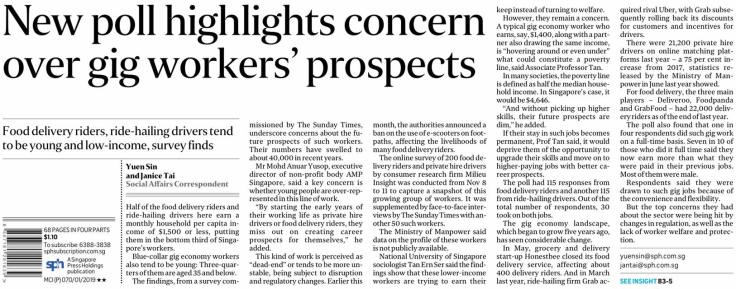
With effect from Tuesday 5 November 2019, electric scooters are banned from usage on footpaths in Singapore. Offenders will face fines of up to S$2,000 and jail sentence of up to 3 months once the ban is strictly enforced from 1 January 2020.
It remain banned on roads in Singapore, although the use of such devices will be allowed on cycling paths and park connector networks.
There is an advisory period from now till 31 December 2019, during which users will be issued warnings, as well as giving them time to adjust. For more info about it, click here.
For many gig workers who are doing food delivery services for companies such as GrabFood and Foodpanda, this recent ban leaves them high and dry because many of them depend on the personal mobility device for making a living.
As such, many of them went in groups to seek audience with Members of Parliament at weekly Meet-the-People Sessions in different constituencies to voice out their frustrations. For more info about it, click
here.
The Sunday Times Insights dated Sunday 17 November 2019, has shed limelight on gig workers who work as food delivery riders and ride-hailing drivers.
The Sunday Times had interviewed 50 food delivery riders and ride-hailing drivers to understand their socio-economic profile and why they joined the gig economy.
It found that these workers fall into 5 common groups. Half are doing such jobs as an interim measure after leaving or losing their previous jobs, or to earn extra cash, while a fifth are individuals from vulnerable backgrounds such as single mothers and former offenders. A similar proportion are sole breadwinners.
4 in 10 are not able to set aside savings from the monthly income, while half of the 35 full-time workers interviewed say they are earning less from their gig jobs than in their previous jobs.
I think targeted solutions should be drawn up, in accordance to the different profiles mentioned in the Sunday Times news report.
Yes, having a job is better than none in this economic downturn.
Having that said, however for young Singaporeans who are aged below 35 years old doing gig work, I think it is important that they need to see a bigger picture that doing this in the long term WITHOUT any intended plans for self-upgrading (be it academic or vocational courses) may actually do them more harm than good.
They also need to have that self-awareness.
They should prepare themselves for the next economic uplift.
Yes, perhaps our government can look into enhancing and extending Workfare scheme and also get these gig-work companies to improve staff welfare and benefits?
For ex-offenders who can’t find other jobs, can The Yellow Ribbon Project help?
Same for SGEnable and Ministry of Social and Family Development for the special-needs and single mums?











Leave a comment